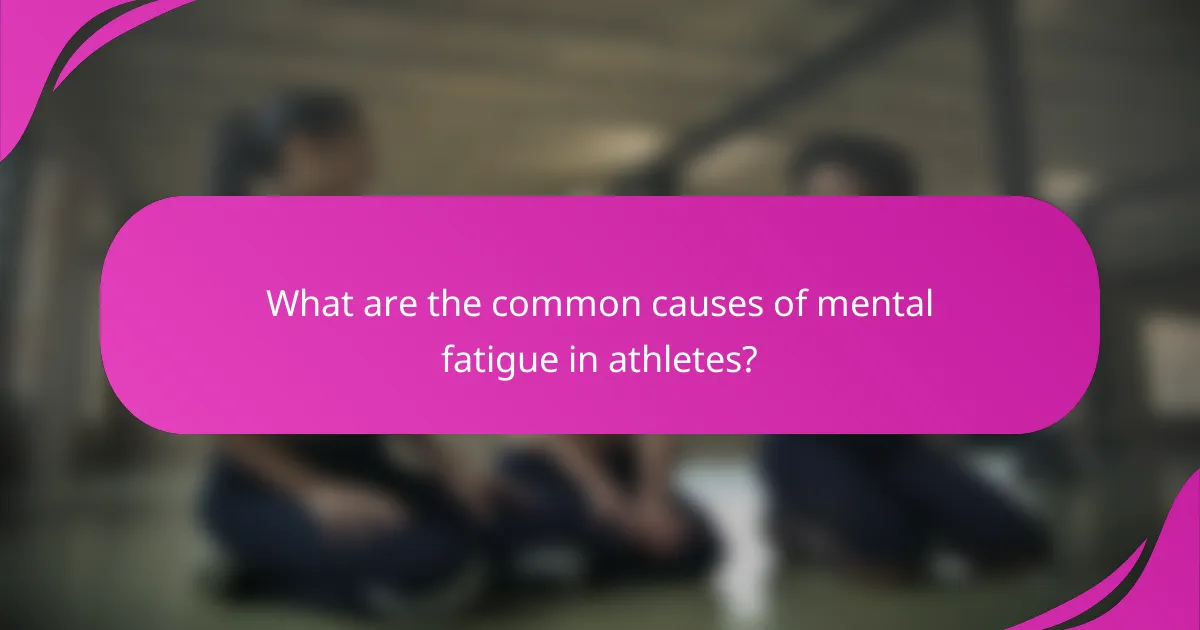Mental fatigue can significantly hinder athletic performance, affecting focus and decision-making. This article explores the causes of mental fatigue, highlights effective recovery techniques, and examines unique approaches to enhance mental resilience. By prioritizing strategies like mindfulness, proper nutrition, and adequate sleep, athletes can optimize their performance and well-being. Understanding these elements is crucial for achieving peak athletic capabilities.

What is Mental Fatigue and How Does it Affect Athletic Performance?
Mental fatigue significantly impairs athletic performance by reducing focus, motivation, and decision-making abilities. Athletes experiencing mental fatigue may struggle with endurance and skill execution, leading to suboptimal results. Recovery techniques like mindfulness, proper sleep, and mental breaks can alleviate these effects, enhancing performance. Studies indicate that mental fatigue can decrease performance by up to 20%, highlighting its critical impact on athletes.
What are the signs and symptoms of mental fatigue in athletes?
Mental fatigue in athletes manifests through various signs and symptoms. Key indicators include decreased motivation, increased irritability, difficulty concentrating, and feelings of exhaustion. Additionally, athletes may experience disrupted sleep patterns and a decline in performance levels. Recognizing these symptoms early is essential for effective recovery and maintaining peak athletic performance.
How does mental fatigue differ from physical fatigue?
Mental fatigue primarily affects cognitive functions, while physical fatigue impacts bodily strength. Mental fatigue results from prolonged mental effort, leading to decreased concentration and decision-making abilities. In contrast, physical fatigue arises from exertion, causing muscle weakness and reduced endurance. Understanding these differences can help athletes implement effective recovery techniques tailored to their specific needs.
What are the psychological impacts of mental fatigue on performance?
Mental fatigue negatively impacts performance by reducing cognitive function, decision-making, and physical endurance. It can lead to decreased focus, slower reaction times, and increased errors. Research indicates that athletes experiencing mental fatigue may perform significantly worse, with studies showing up to a 30% decline in performance metrics. Recovery techniques such as adequate rest, mindfulness practices, and structured breaks can mitigate these effects, enhancing overall athletic performance.

What are the common causes of mental fatigue in athletes?
Common causes of mental fatigue in athletes include prolonged training, high competition stress, inadequate recovery, poor nutrition, and sleep deprivation. These factors can lead to decreased performance and motivation.
Prolonged training demands cognitive focus, which can drain mental resources. High competition stress creates pressure, impacting mental clarity. Inadequate recovery prevents the brain from recuperating, leading to burnout. Poor nutrition affects energy levels and cognitive function. Sleep deprivation impairs concentration and decision-making abilities.
Addressing these causes is essential for optimizing athletic performance and ensuring mental well-being.
How does training intensity contribute to mental fatigue?
Training intensity significantly contributes to mental fatigue by depleting cognitive resources and increasing perceived exertion. High-intensity workouts elevate stress hormones, which can lead to mental exhaustion. As a result, athletes may experience reduced focus and decision-making ability. Recovery techniques, such as adequate rest and nutrition, are essential for restoring mental energy and optimizing performance. Research indicates that balancing training intensity with recovery can enhance overall athletic effectiveness.
What role does competition stress play in mental fatigue?
Competition stress significantly contributes to mental fatigue by heightening anxiety and cognitive load during athletic performance. This stress can lead to decreased focus and decision-making abilities. As athletes face intense competition, the pressure to perform can deplete mental resources, resulting in fatigue. Recovery techniques, such as mindfulness and structured rest, are essential to mitigate these effects and enhance overall performance. Understanding this relationship is crucial for athletes aiming to optimize their mental resilience and recovery strategies.
How can lifestyle factors lead to increased mental fatigue?
Lifestyle factors significantly contribute to increased mental fatigue through poor sleep, inadequate nutrition, and high stress levels. Lack of sleep impairs cognitive function, making tasks feel more exhausting. Poor nutrition can lead to energy dips, affecting mental clarity. High stress triggers the body’s fight-or-flight response, causing mental exhaustion. Each of these factors uniquely impacts mental performance, leading to decreased productivity and overall well-being. Addressing these lifestyle elements is crucial for recovery and improved athletic performance.

What are effective recovery techniques for mental fatigue?
Effective recovery techniques for mental fatigue include mindfulness practices, physical activity, proper nutrition, and adequate sleep. These methods enhance cognitive function and overall well-being. Mindfulness techniques, such as meditation, reduce stress and improve focus. Engaging in physical exercise boosts mood and energy levels. Nutritional choices, like omega-3 fatty acids and antioxidants, support brain health. Prioritizing sleep helps restore mental clarity and resilience. Implementing these techniques can lead to improved athletic performance and mental endurance.
What role does sleep play in recovery from mental fatigue?
Sleep plays a crucial role in recovering from mental fatigue by restoring cognitive functions and enhancing overall well-being. Quality sleep facilitates memory consolidation, emotional regulation, and stress reduction. Research indicates that adequate sleep improves attention and decision-making, which are vital for athletic performance. Furthermore, sleep deprivation can lead to increased levels of fatigue, decreased motivation, and impaired recovery. Prioritizing sleep is essential for both mental recovery and optimal athletic output.
How can mindfulness practices aid in mental recovery?
Mindfulness practices significantly enhance mental recovery by reducing stress and improving focus. Techniques such as meditation and deep breathing foster emotional regulation, which is crucial for athletes facing mental fatigue. Research indicates that consistent mindfulness training can lower anxiety levels by up to 30%, leading to better performance outcomes. As a result, athletes can recover more effectively, maintaining peak mental health and readiness.
What nutritional strategies can support mental recovery?
Nutritional strategies that support mental recovery include a balanced diet rich in omega-3 fatty acids, antioxidants, and complex carbohydrates. Omega-3s, found in fatty fish and walnuts, improve brain function and mood. Antioxidants, present in berries and dark chocolate, combat oxidative stress. Complex carbohydrates, like whole grains, stabilize blood sugar levels, enhancing energy and focus. Regular hydration is essential for cognitive performance.

What unique approaches can enhance mental recovery for athletes?
Unique approaches that enhance mental recovery for athletes include mindfulness practices, cognitive behavioral techniques, and structured recovery protocols. These methods address mental fatigue and improve performance. Mindfulness reduces stress and enhances focus, while cognitive behavioral techniques help athletes reframe negative thoughts. Structured recovery protocols, such as scheduled downtime and mental health check-ins, foster resilience. Integrating these strategies can lead to significant improvements in mental well-being and athletic performance.
How can mental conditioning and visualization techniques improve recovery?
Mental conditioning and visualization techniques significantly enhance recovery by fostering a positive mental state. These techniques help athletes mentally rehearse their performance, reducing anxiety and enhancing focus. Visualization can accelerate physical recovery by promoting relaxation and reducing stress, which are crucial for healing. Studies show that athletes who practice these techniques often report improved recovery times and overall performance.
What is the significance of mental health support in athletic recovery?
Mental health support is crucial in athletic recovery as it enhances overall performance and resilience. Athletes often face mental fatigue, which can hinder physical recovery and performance. Effective mental health strategies, such as counseling and mindfulness, can lead to improved focus, reduced anxiety, and better coping mechanisms. Research indicates that athletes who engage in psychological support report faster recovery times and fewer injuries. Prioritizing mental well-being is essential for achieving peak athletic performance and sustaining long-term success.

What are some rare but impactful strategies for overcoming mental fatigue?
Engaging in mindful movement practices can effectively combat mental fatigue. Techniques such as Tai Chi or yoga promote relaxation while enhancing focus. Incorporating nature immersion, like forest bathing, has shown to reduce stress and rejuvenate mental clarity. Another rare but impactful strategy is the use of micro-dosing certain natural supplements, which may improve cognitive function and energy levels. Lastly, adopting a polyphasic sleep schedule can optimize recovery and mental performance.
How can technology and biofeedback assist in monitoring mental fatigue?
Technology and biofeedback can effectively monitor mental fatigue by providing real-time data on physiological responses. Wearable devices track metrics like heart rate variability and brainwave activity, offering insights into stress levels. Biofeedback techniques teach users to control physiological functions, enhancing recovery strategies. This integration helps athletes optimize performance by identifying fatigue patterns and adjusting training accordingly.
What unconventional methods have athletes used to combat mental fatigue?
Athletes have employed various unconventional methods to combat mental fatigue, including visualization techniques, mindfulness meditation, and unconventional breathing exercises. These approaches enhance focus and reduce stress, ultimately improving performance. For example, some athletes use guided imagery to mentally rehearse their routines, which can lead to increased confidence and reduced anxiety. Others practice mindfulness to stay present, helping them manage distractions during competition. Breathing exercises, like the Wim Hof method, have gained popularity for their potential to increase oxygen flow and reduce stress levels, promoting mental clarity.

What best practices can athletes implement to prevent mental fatigue?
Athletes can prevent mental fatigue by implementing structured recovery techniques. Prioritizing adequate sleep, engaging in mindfulness practices, and maintaining a balanced diet significantly enhance mental resilience. Regular breaks during training, social interactions, and setting realistic goals further support mental clarity and focus.
How can athletes create a balanced training schedule to mitigate fatigue?
Athletes can create a balanced training schedule by incorporating rest, cross-training, and periodization. Prioritizing recovery techniques reduces mental fatigue and enhances performance.
Including rest days allows for physical and mental recovery, preventing burnout. Cross-training offers variety, reducing repetitive strain while engaging different muscle groups. Periodization involves structured training cycles that optimize performance and recovery, ensuring athletes peak at the right time.
Research indicates that athletes who balance intensity with recovery report lower fatigue levels and improved focus. This approach helps maintain motivation and reduces the risk of overtraining, ultimately enhancing athletic performance.
What role does team support play in managing mental fatigue?
Team support plays a crucial role in managing mental fatigue by providing emotional and practical assistance. Strong team dynamics foster a sense of belonging, reducing feelings of isolation that often accompany mental fatigue. Supportive teammates can share workload, offer encouragement, and help maintain motivation, which are essential in recovery. Research indicates that athletes with robust team support systems report lower levels of mental fatigue and higher performance outcomes. Thus, cultivating a supportive team environment is vital for optimal athletic performance and mental resilience.
What are the common mistakes athletes make in managing mental fatigue?
Athletes often mismanage mental fatigue by neglecting recovery, underestimating its impact, and failing to seek support. They may push through fatigue, believing it demonstrates toughness, which can lead to burnout. Additionally, poor time management in balancing training and rest exacerbates fatigue. Ignoring signs of mental fatigue, such as irritability or decreased performance, prevents timely intervention. Lastly, lack of mental conditioning and coping strategies can hinder recovery, leaving athletes vulnerable to prolonged fatigue and diminished performance.
How can athletes optimize their mental recovery strategies for better performance?
Athletes can enhance mental recovery strategies through mindfulness, structured rest, and cognitive behavioral techniques. Mindfulness practices, such as meditation, improve focus and reduce anxiety. Structured rest, including sleep optimization and scheduled downtime, supports mental rejuvenation. Cognitive behavioral techniques help athletes reframe negative thoughts, enhancing resilience and performance. Implementing these strategies can lead to improved athletic outcomes and reduced mental fatigue.